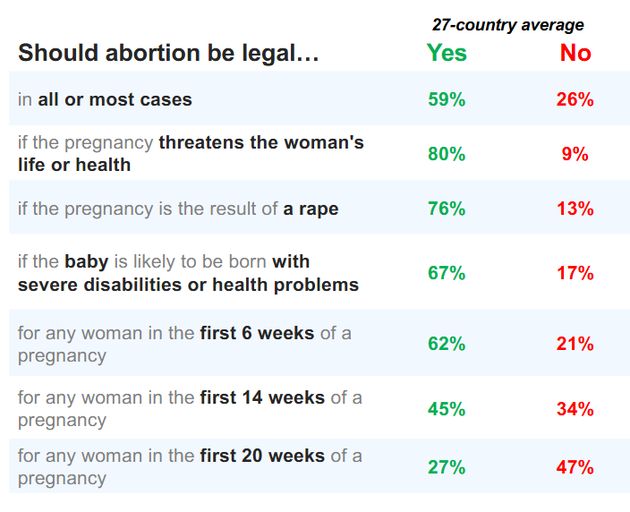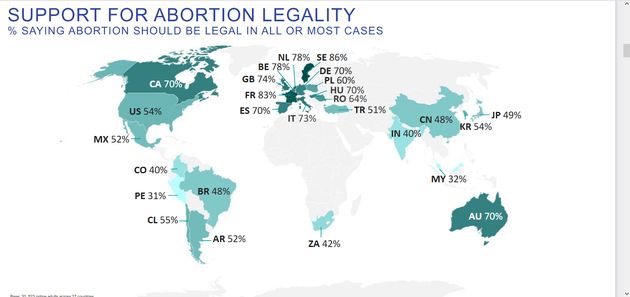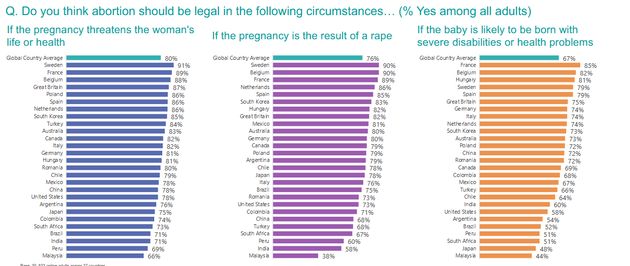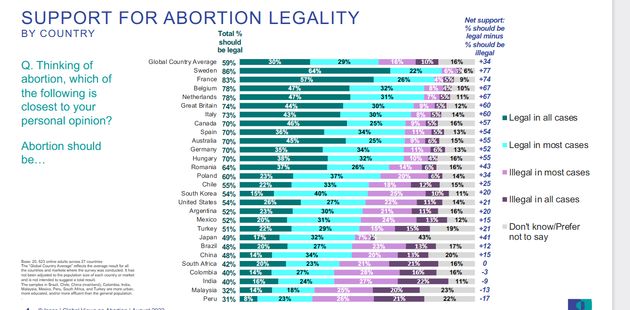A global survey shows that 59% of adults say abortion should always be legal. Sweden and France are at the top of the European countries, Türkiye and Poland at the bottom.
(Evangelical Focus) According to a survey by the research company Ipsos, 59% of adults surveyed in 27 countries worldwide said abortion should be legal in all or most cases, while 26% say it should be illegal in all or most cases.
Furthermore, four in five adults pointed out that it should be allowed if the pregnancy threatens the life or health of the woman, 76% if it is the result of a rape, and 67% if the baby could have severe disabilities or health problems.
Regarding the length of pregnancy, the majority (62%) said abortion should be legal for any woman in the first six weeks of pregnancy, 45% in the first 14 weeks, and just 27% in the first 20 weeks.
[Click here to subscribe to Pregnancy Help News!]
If an abortion is carried out illegally, fewer think the woman who had the abortion should be penalized (32%) than so of the person who performed it (44%) or someone else who arranged for it (42%).

Europe leads support for legal abortion
European respondents are the ones who mostly support abortion in all or most cases. Nine of the top ten countries where respondents are in favour of abortion are in Europe.
Sweden is at the top of the list (86%), followed by France (83%), Netherlands and Belgium (78% both). On the contrary, the countries in Europe with less support for unrestricted abortion are (60%) and Romania (64%).

Those same countries also head the list of respondents who believe that abortion should be legal if the mother's life is in danger or if there is rape. However, when it is the baby that may be born with disabilities or health problems, Sweden drops out of the top 3 and Hungary takes over the ranking.

When asked about the legal status of abortion depending on how long a woman has been pregnant, Europeans are also the ones who most accept that abortion should be legal beyond the 12 weeks, which, according to Ipsos, is “the most common gestational limit in countries allowing abortion on request”.
Sweden (70%) and the UK (65%) are the countries where more people said abortion should be legal in the first 14 weeks of a pregnancy, while the Turkish (29%) and Polish (40%) are the Europeans less likely to agree with that.
The numbers drop significantly for abortions in the first 20 weeks, but Sweden (44%) and the UK (40%) are still in the lead, with Turkey (14%) and Hungary (21%) at the bottom of the European countries.
Less penalties for illegal abortions
Moreover, European countries are at the bottom only when it comes to penalising those involved in illegal abortion, whether the woman or the one carrying it out.
The Swedish (15% - 26%) and French (17%-27%) are the least likely to believe in penalising either one or the other, while Italy (33%-53%) and Romania (32% - 46%) are at the top.
Tweet This: Global survey shows Europe leads support for legal abortion - Nine of the top 10 countries where respondents are in favor are in Europe.
Legal abortion support outside Europe
In the US, where the abortion debate continues to grow in the aftermath of the Supreme Court's decision on 'Roe v Wade' last summer, 54% of the adults surveyed responded abortion should be legal in all or most cases.
The survey shows that although “those who say it should be legal outnumber those who say it shouldn’t, opposition prevails in 4 countries: Peru, Malaysia, India, and Colombia”.

Those are also the countries that least accept that abortion may be legal for health problems of the woman or the baby, or that it may take place after over 6 weeks of gestation.
Editor's note: This article was published by Evangelical Focus and is reprinted with permission.






